25 apr 2019
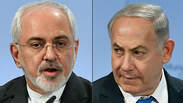
Iranian Foreign Minister Mohammad Javad Zarif and Prime Minister Netanyahu
Iranian foreign minister says Trump's 'B-team' - which includes Netanyahu and national security adviser Bolton - might 'plot an accident' to trigger a broader crisis or even an armed conflict
Iranian Foreign Minister Mohammad Javad Zarif does not believe US President Donald Trump wants war with Iran, but Trump could be lured into a conflict by his Israeli counterpart and anti-Iran advisers, he said in an interview on Wednesday.
"I don't think he wants war," Zarif said in an interview at the Iranian mission to the United Nations in New York. "But that doesn't exclude him being basically lured into one." The White House did not immediately respond to a request for comment on Zarif's remarks.
Zarif said a so-called "B-team," including Trump's national security adviser John Bolton, an ardent Iran hawk, and Prime Minister Benjamin Netanyahu could goad Trump into a conflict with Tehran.
"Those who have designed the policies that are being pursued do not simply want a negotiated solution. But let me make it clear that Iran is not seeking confrontation, but will not escape defending itself," he said.
In somewhat cryptic remarks, Zarif also warned of the possibility that people could try "to plot an accident" that could trigger a broader crisis.
Tensions between Tehran and Washington have risen since the Trump administration withdrew last year from an international nuclear deal with Iran and began ratcheting up sanctions. Earlier this month, the United States blacklisted Iran's elite Revolutionary Guards (IRGC) and demanded buyers of Iranian oil stop purchases by May or face sanctions.
The US blacklisting of the IRGC, Iran's most powerful security organization with huge stakes in the economy, was the first time any nation has labeled another country's military a terrorist organization.
Zarif said Iran would act with "prudence" in response to what he saw as dangerous policies by the United States. In one example, he said Iran would still allow US warships to pass through the Strait of Hormuz, the world's most important oil artery.
RULES OF ENGAGEMENT
Zarif called the decision on the IRGC "absurd," but suggested that Iran did not plan to respond militarily unless the United States changed the rules of engagement guiding how it interacts with Iran's forces. The US military has not suggested it would change its behavior after the blacklisting.
"We will exercise prudence but it doesn't mean that if the United States changed the rules of the game, or changed the rules of engagement, it would be able to get away with that," Zarif said.
Iranian President Hassan Rouhani and some senior military commanders have threatened to disrupt oil shipments from the Gulf countries if Washington tries to strangle Tehran oil exports.
Carrying one third of the world's seaborne oil every day, the Strait of Hormuz links Middle East crude producers to markets in Asia Pacific, Europe, North America and beyond.
When asked if US warships could still pass through the Strait of Hormuz, Zarif - a veteran diplomat who has been foreign minister for more than six years - said: "Ships can go through the Strait of Hormuz."
"If the United States wanted to continue to observe the rules of engagement, the rules of the game, the channels of communication, the prevailing protocols, then in spite of the fact that we consider US presence in the Persian Gulf as inherently destabilizing, we're not going to take any action," Zarif said.
The United States has accused Tehran of destabilizing the Middle East and helping to prop up Syrian President Bashar al-Assad in a civil war that began in 2011.
Iranian Major General Qassem Soleimani, the head of Iran's elite Quds Force, the overseas arm of the IRGC, appeared on frontlines across Syria.
Zarif said Iran would remain "vigilant" in Syria and in Iraq after investing resources to fight there. "And we will not simply abandon that, that fight," Zarif said.
'PHD' IN SANCTIONS BUSTING
Zarif, the US-educated architect of the 2015 nuclear deal who came under attack from anti-Western hardliners in Iran after Trump pulled out of the agreement last year, signaled Tehran would be resilient in the face of US sanctions.
"I mean there are always ways of going around the sanctions. We have a PhD in that area," Zarif said.
The United States on Monday demanded buyers of Iranian oil stop purchases by May or face sanctions, ending six months of waivers which allowed Iran's eight biggest buyers, most of them in Asia, to continue importing limited volumes.
Zarif acknowledged that oil sanctions hurt ordinary Iranians and the government would do whatever it could to sell oil to provide for its citizens.
When asked who else Iran might consider selling oil to, Zarif said: "If I told you, we won't be able to sell it to them."
Iranian foreign minister says Trump's 'B-team' - which includes Netanyahu and national security adviser Bolton - might 'plot an accident' to trigger a broader crisis or even an armed conflict
Iranian Foreign Minister Mohammad Javad Zarif does not believe US President Donald Trump wants war with Iran, but Trump could be lured into a conflict by his Israeli counterpart and anti-Iran advisers, he said in an interview on Wednesday.
"I don't think he wants war," Zarif said in an interview at the Iranian mission to the United Nations in New York. "But that doesn't exclude him being basically lured into one." The White House did not immediately respond to a request for comment on Zarif's remarks.
Zarif said a so-called "B-team," including Trump's national security adviser John Bolton, an ardent Iran hawk, and Prime Minister Benjamin Netanyahu could goad Trump into a conflict with Tehran.
"Those who have designed the policies that are being pursued do not simply want a negotiated solution. But let me make it clear that Iran is not seeking confrontation, but will not escape defending itself," he said.
In somewhat cryptic remarks, Zarif also warned of the possibility that people could try "to plot an accident" that could trigger a broader crisis.
Tensions between Tehran and Washington have risen since the Trump administration withdrew last year from an international nuclear deal with Iran and began ratcheting up sanctions. Earlier this month, the United States blacklisted Iran's elite Revolutionary Guards (IRGC) and demanded buyers of Iranian oil stop purchases by May or face sanctions.
The US blacklisting of the IRGC, Iran's most powerful security organization with huge stakes in the economy, was the first time any nation has labeled another country's military a terrorist organization.
Zarif said Iran would act with "prudence" in response to what he saw as dangerous policies by the United States. In one example, he said Iran would still allow US warships to pass through the Strait of Hormuz, the world's most important oil artery.
RULES OF ENGAGEMENT
Zarif called the decision on the IRGC "absurd," but suggested that Iran did not plan to respond militarily unless the United States changed the rules of engagement guiding how it interacts with Iran's forces. The US military has not suggested it would change its behavior after the blacklisting.
"We will exercise prudence but it doesn't mean that if the United States changed the rules of the game, or changed the rules of engagement, it would be able to get away with that," Zarif said.
Iranian President Hassan Rouhani and some senior military commanders have threatened to disrupt oil shipments from the Gulf countries if Washington tries to strangle Tehran oil exports.
Carrying one third of the world's seaborne oil every day, the Strait of Hormuz links Middle East crude producers to markets in Asia Pacific, Europe, North America and beyond.
When asked if US warships could still pass through the Strait of Hormuz, Zarif - a veteran diplomat who has been foreign minister for more than six years - said: "Ships can go through the Strait of Hormuz."
"If the United States wanted to continue to observe the rules of engagement, the rules of the game, the channels of communication, the prevailing protocols, then in spite of the fact that we consider US presence in the Persian Gulf as inherently destabilizing, we're not going to take any action," Zarif said.
The United States has accused Tehran of destabilizing the Middle East and helping to prop up Syrian President Bashar al-Assad in a civil war that began in 2011.
Iranian Major General Qassem Soleimani, the head of Iran's elite Quds Force, the overseas arm of the IRGC, appeared on frontlines across Syria.
Zarif said Iran would remain "vigilant" in Syria and in Iraq after investing resources to fight there. "And we will not simply abandon that, that fight," Zarif said.
'PHD' IN SANCTIONS BUSTING
Zarif, the US-educated architect of the 2015 nuclear deal who came under attack from anti-Western hardliners in Iran after Trump pulled out of the agreement last year, signaled Tehran would be resilient in the face of US sanctions.
"I mean there are always ways of going around the sanctions. We have a PhD in that area," Zarif said.
The United States on Monday demanded buyers of Iranian oil stop purchases by May or face sanctions, ending six months of waivers which allowed Iran's eight biggest buyers, most of them in Asia, to continue importing limited volumes.
Zarif acknowledged that oil sanctions hurt ordinary Iranians and the government would do whatever it could to sell oil to provide for its citizens.
When asked who else Iran might consider selling oil to, Zarif said: "If I told you, we won't be able to sell it to them."
24 apr 2019
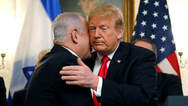
A Pew research survey found that far more Americans favor Israelis than their government; support for Israel among Republicans is higher than among Democrats and most have negative view of the PA
A survey in the United States found that most Americans, 64%, have a positive opinion regarding Israeli society. However, only 41% of those surveyed had a positive view on the Israeli government; 51% have a negative view.
The survey was conducted by the Pew Research Center during the first half of April and included 10,523 people. The survey demonstrated a stark difference in how Republican and Democratic voters view Israel. 77% of Republicans support Israel while among Democrats that number is 57%.
Regarding opinions on the government, the gap was even wider: 61% of Republicans support the Israeli government while only 32% of Democrats said they do. Two thirds of Democrats have a negative opinion regarding Israel's government, compared to 26% of Republicans polled.
More Democrats view the Palestinians favorably than Republicans, 58% versus 32%. Voters of both parties have strongly negative views of the Palestinian government — 81% of Republicans and 65% of Democrats.
Overall, 46% of Americans said they supported the Palestinians while only 19% said they supported their government.
Ahead of the yet-to-be unveiled Trump peace plan, half of those polled thought that the president would be able to achieve peace between Israel and the Palestinians and 34% said they felt that Trump is more inclined to support Israel, compared to 6% who view Trump as somewhat hostile to Israel.
79% of Republicans believe that Trump treats both sides equally while among Democrats, 54% said that the president is biased in Israel's favor.
Most Democrats who consider themselves to be liberals —66% —believe that Trump is very biased toward Israel, while among more moderate Democrats, 43% said that Trump is biased and 38$ said that his approach is balanced.
A survey in the United States found that most Americans, 64%, have a positive opinion regarding Israeli society. However, only 41% of those surveyed had a positive view on the Israeli government; 51% have a negative view.
The survey was conducted by the Pew Research Center during the first half of April and included 10,523 people. The survey demonstrated a stark difference in how Republican and Democratic voters view Israel. 77% of Republicans support Israel while among Democrats that number is 57%.
Regarding opinions on the government, the gap was even wider: 61% of Republicans support the Israeli government while only 32% of Democrats said they do. Two thirds of Democrats have a negative opinion regarding Israel's government, compared to 26% of Republicans polled.
More Democrats view the Palestinians favorably than Republicans, 58% versus 32%. Voters of both parties have strongly negative views of the Palestinian government — 81% of Republicans and 65% of Democrats.
Overall, 46% of Americans said they supported the Palestinians while only 19% said they supported their government.
Ahead of the yet-to-be unveiled Trump peace plan, half of those polled thought that the president would be able to achieve peace between Israel and the Palestinians and 34% said they felt that Trump is more inclined to support Israel, compared to 6% who view Trump as somewhat hostile to Israel.
79% of Republicans believe that Trump treats both sides equally while among Democrats, 54% said that the president is biased in Israel's favor.
Most Democrats who consider themselves to be liberals —66% —believe that Trump is very biased toward Israel, while among more moderate Democrats, 43% said that Trump is biased and 38$ said that his approach is balanced.
23 apr 2019

Trump adviser and son-in-law said Israeli elections, Ramadan all a factor in determining timing of the deal; criticized passed efforts for focusing only on two-state solution
Jared Kushner, son-in-law and adviser to US President Donald Trump issued some comments Tuesday on the much talked about "deal of the century" being proposed by the administration to end the Israeli-Palestinian conflict. "Both sides will have to make difficult concessions," he said. Kushner also said that the deal was set to be announced last year but the Israeli elections changed the timing.
Kushner criticized the Two-state paradigm along with previous efforts to reach an agreement. "If people focus on the old traditional talking points, we will never make progress. The Arab peace initiative of 2002, which I think was a very good attempt but if that would have worked it would have made peace a long time ago," Kushner said. "We will do something different."
He maintained that the administration's approach was unique and that they studied all the previous attempts, how and why they failed.
Regarding timing, Kushner said that the deal would likely be announced only after the Muslim holy month of Ramadan. He also congratulated Prime Minister Netanyahu on his election victory and added that the coalition building process was also a factor.
"Our focus is really on the bottom up —which is how do you make the lives of the Palestinian people better? What can you resolve to allow these areas to become more investable," Kushner said. "We deal with all the core status issues because you have to do it, but we have also built a robust business plan for the whole region. I think that the two together have the opportunity to push forward," adding that Israel's security is of primary importance but that both sides will have to make compromises.
Kushner also said that he believes that the proposal will not be accepted easily on both sides but that ultimately, they will see that it will improve their lives in a practical manner. "Let's see if the leadership on both sides have the courage to make progress."
Jared Kushner, son-in-law and adviser to US President Donald Trump issued some comments Tuesday on the much talked about "deal of the century" being proposed by the administration to end the Israeli-Palestinian conflict. "Both sides will have to make difficult concessions," he said. Kushner also said that the deal was set to be announced last year but the Israeli elections changed the timing.
Kushner criticized the Two-state paradigm along with previous efforts to reach an agreement. "If people focus on the old traditional talking points, we will never make progress. The Arab peace initiative of 2002, which I think was a very good attempt but if that would have worked it would have made peace a long time ago," Kushner said. "We will do something different."
He maintained that the administration's approach was unique and that they studied all the previous attempts, how and why they failed.
Regarding timing, Kushner said that the deal would likely be announced only after the Muslim holy month of Ramadan. He also congratulated Prime Minister Netanyahu on his election victory and added that the coalition building process was also a factor.
"Our focus is really on the bottom up —which is how do you make the lives of the Palestinian people better? What can you resolve to allow these areas to become more investable," Kushner said. "We deal with all the core status issues because you have to do it, but we have also built a robust business plan for the whole region. I think that the two together have the opportunity to push forward," adding that Israel's security is of primary importance but that both sides will have to make compromises.
Kushner also said that he believes that the proposal will not be accepted easily on both sides but that ultimately, they will see that it will improve their lives in a practical manner. "Let's see if the leadership on both sides have the courage to make progress."
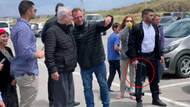
Security guard carrying anti-drone rifle
Vacationing with his family during Passover, PM announces intention to name a town in the strategic plateau after a president much-appreciated in Israel
Prime Minister Benjamin Netanyahu announced Monday that he intends to name a town in the Golan Heights after US President Donald Trump.
"A few weeks ago, I attained the official recognition by President Trump recognizing Israeli sovereignty over the Golan Heights for all eternity," Netanyahu said during a family trip to the northern region. "There is a need to express our gratitude by naming a town or settlement in the Golan Heights after Donald Trump; I will bring it for government approval in the near future."
Last month, Netanyahu visited Trump at the White House where the president signed a declaration recognizing Israeli sovereignty over the strategic plateau Israel captured from Syria during the 1967 Six Day War.
The prime minster was on vacation with his wife Sara and children Yair and Avner in the Golan region. They visited Nahal Sa'ar and Nimrod Fortress, rode jeeps and visited Mt. Hermon as well.
While covering the prime minister's trip, reporters noticed that his security detail has been outfitted with anti-drone rifles.
The device uses radio waves to disrupt the drone's remote-controlled radio communication, causing the drone to drop to the ground or leave the area.
The device appears to be manufactured by the Chinese company HIKVISION which sells its product to law enforcement agencies throughout the world.
Its technical specifications indicate that it can operate along a wide range of frequencies, has a range of one kilometer, a 9X zoom telescope and rechargeable, durable lithium batteries.
In 2017, a State Comptroller report warned about the threat posed by flying drones toward security sensitive sites and individuals and that a solution should be implemented.
The Netanyahu family arrived in the North on Monday and visited an ancient synagogue in Kfar Nahum (Capernaum) and the Gamal Reserves. At night they stayed at a hotel in Tiberias.
While hiking along Nahal Sa'ar, they met dozens of Israeli families enjoying their Passover vacation and many cried out in joy at the sight of the prime minister. Some sang "Bibi, king of Israel."
Vacationing with his family during Passover, PM announces intention to name a town in the strategic plateau after a president much-appreciated in Israel
Prime Minister Benjamin Netanyahu announced Monday that he intends to name a town in the Golan Heights after US President Donald Trump.
"A few weeks ago, I attained the official recognition by President Trump recognizing Israeli sovereignty over the Golan Heights for all eternity," Netanyahu said during a family trip to the northern region. "There is a need to express our gratitude by naming a town or settlement in the Golan Heights after Donald Trump; I will bring it for government approval in the near future."
Last month, Netanyahu visited Trump at the White House where the president signed a declaration recognizing Israeli sovereignty over the strategic plateau Israel captured from Syria during the 1967 Six Day War.
The prime minster was on vacation with his wife Sara and children Yair and Avner in the Golan region. They visited Nahal Sa'ar and Nimrod Fortress, rode jeeps and visited Mt. Hermon as well.
While covering the prime minister's trip, reporters noticed that his security detail has been outfitted with anti-drone rifles.
The device uses radio waves to disrupt the drone's remote-controlled radio communication, causing the drone to drop to the ground or leave the area.
The device appears to be manufactured by the Chinese company HIKVISION which sells its product to law enforcement agencies throughout the world.
Its technical specifications indicate that it can operate along a wide range of frequencies, has a range of one kilometer, a 9X zoom telescope and rechargeable, durable lithium batteries.
In 2017, a State Comptroller report warned about the threat posed by flying drones toward security sensitive sites and individuals and that a solution should be implemented.
The Netanyahu family arrived in the North on Monday and visited an ancient synagogue in Kfar Nahum (Capernaum) and the Gamal Reserves. At night they stayed at a hotel in Tiberias.
While hiking along Nahal Sa'ar, they met dozens of Israeli families enjoying their Passover vacation and many cried out in joy at the sight of the prime minister. Some sang "Bibi, king of Israel."
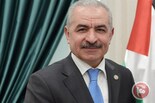
Palestinian Prime Minister Muhammad Ishtayeh said, on Tuesday, that the actions and decisions of the United States administration regarding the Palestinians and their cause including cutting aid to UNRWA, moving the embassy to Jerusalem, and recognizing Jerusalem as the capital of Israel are worse than the text of the so-called "Deal of the Century."
This came during a meeting Ishtayeh held at his office in Ramallah City, in the central occupied West Bank, with US Senator Ron Wyden, where the two discussed the latest political developments.
Ishtayeh said, "Talking about annexing parts of the West Bank under the so-called settlement blocs destroys the two-state solution and eliminates any chance of establishing an independent Palestinian state on the 1967 borders."
Ishtayeh added, "We must separate the Palestinian-American relations from the peace process or the political process that is going on. The stalemate of the peace process must not be met with punishment or blackmail from the American administration of the Palestinian people. We want it to be an honest peace broker."
Ishtayeh also called on the US Congress to follow suit of many other world parliaments and vote to recognize the State of Palestine and to lift the sanctions imposed on the Palestine Liberation Organization (PLO).
This came during a meeting Ishtayeh held at his office in Ramallah City, in the central occupied West Bank, with US Senator Ron Wyden, where the two discussed the latest political developments.
Ishtayeh said, "Talking about annexing parts of the West Bank under the so-called settlement blocs destroys the two-state solution and eliminates any chance of establishing an independent Palestinian state on the 1967 borders."
Ishtayeh added, "We must separate the Palestinian-American relations from the peace process or the political process that is going on. The stalemate of the peace process must not be met with punishment or blackmail from the American administration of the Palestinian people. We want it to be an honest peace broker."
Ishtayeh also called on the US Congress to follow suit of many other world parliaments and vote to recognize the State of Palestine and to lift the sanctions imposed on the Palestine Liberation Organization (PLO).
17 apr 2019
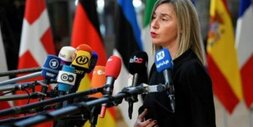
The European Union’s foreign policy chief Federica Mogherini has once again expressed the 28-nation bloc’s disapproval of the Israeli regime’s claim of “sovereignty” to Syria’s Golan Heights and other Tel Aviv-occupied territories.
Speaking at the plenary session of the European Parliament, in the French city of Strasbourg, on Tuesday, Mogherini stressed that the EU’s position on the status of Golan “has not changed.”
“The EU has a very simple and clear position,” she said. “The EU does not recognize Israeli sovereignty over any of the territories occupied by Israel since June 1967, in line with international law and with UN Security Council Resolutions 242 and 497. And this also applies to the Golan Heights.”
The EU’s top diplomat also noted, according to the PNN, that she had already issued a declaration on behalf of all the 28 member states and clarified their stance on the Golan Heights.
Additionally, she said, the five EU member states of the UN Security Council – including the UK, France, Germany, Belgium and Poland – had expressed the bloc’s common position on Golan in a joint stake-out.
Israel seized the Golan Heights from Syria in the closing stages of its 1967 Six-Day War with Arab countries, which also saw the regime occupy the Palestinian territories of the West Bank, East Jerusalem al-Quds and the Gaza Strip.
Tel Aviv unilaterally annexed the Golan Heights in 1981, in a move not recognized internationally.
Syria has repeatedly reaffirmed its sovereignty over the Golan Heights, saying the territory must be completely restored to its control.
On March 25, US President Donald Trump signed a decree recognizing Israeli “sovereignty” over the occupied Golan at the start of a meeting with Israeli Prime Minister Benjamin Netanyahu, in Washington.
Trump’s controversial policy shift came over a year after the hawkish US president recognized Jerusalem al-Quds as the “capital” of Israel and transferred Washington’s embassy from Tel Aviv to the occupied Palestinian city.
Emboldened by Trump’s highly anti-Palestine agenda, Netanyahu has talked of plans to annex the occupied Palestinian region of the West Bank.
Illegal settlement activities
Elsewhere in her speech, Mogherini complained that Israel’s settlement construction activities in the occupied Palestinian lands were eroding any prospect of a two-state solution.
After a recent announcement by Israel to build 4,600 new settler units, the EU emphasized that it considered “all settlement activity illegal under international law, and that settlements erode the viability of the two-state solution,” she said.
“And in fact, the two-state solution is not only fading away. It is being dismantled piece by piece,” she added, warning that abandoning the solution would bring greater chaos, not only to the occupied territories but also to the entire Middle East.
Israel has over the past months stepped up its settlement construction activities in the occupied lands in defiance of United Nations Security Council Resolution 2334.
About 600,000 Israelis live in over 230 settlements built illegally since the 1967 occupation of the Palestinian lands.
Speaking at the plenary session of the European Parliament, in the French city of Strasbourg, on Tuesday, Mogherini stressed that the EU’s position on the status of Golan “has not changed.”
“The EU has a very simple and clear position,” she said. “The EU does not recognize Israeli sovereignty over any of the territories occupied by Israel since June 1967, in line with international law and with UN Security Council Resolutions 242 and 497. And this also applies to the Golan Heights.”
The EU’s top diplomat also noted, according to the PNN, that she had already issued a declaration on behalf of all the 28 member states and clarified their stance on the Golan Heights.
Additionally, she said, the five EU member states of the UN Security Council – including the UK, France, Germany, Belgium and Poland – had expressed the bloc’s common position on Golan in a joint stake-out.
Israel seized the Golan Heights from Syria in the closing stages of its 1967 Six-Day War with Arab countries, which also saw the regime occupy the Palestinian territories of the West Bank, East Jerusalem al-Quds and the Gaza Strip.
Tel Aviv unilaterally annexed the Golan Heights in 1981, in a move not recognized internationally.
Syria has repeatedly reaffirmed its sovereignty over the Golan Heights, saying the territory must be completely restored to its control.
On March 25, US President Donald Trump signed a decree recognizing Israeli “sovereignty” over the occupied Golan at the start of a meeting with Israeli Prime Minister Benjamin Netanyahu, in Washington.
Trump’s controversial policy shift came over a year after the hawkish US president recognized Jerusalem al-Quds as the “capital” of Israel and transferred Washington’s embassy from Tel Aviv to the occupied Palestinian city.
Emboldened by Trump’s highly anti-Palestine agenda, Netanyahu has talked of plans to annex the occupied Palestinian region of the West Bank.
Illegal settlement activities
Elsewhere in her speech, Mogherini complained that Israel’s settlement construction activities in the occupied Palestinian lands were eroding any prospect of a two-state solution.
After a recent announcement by Israel to build 4,600 new settler units, the EU emphasized that it considered “all settlement activity illegal under international law, and that settlements erode the viability of the two-state solution,” she said.
“And in fact, the two-state solution is not only fading away. It is being dismantled piece by piece,” she added, warning that abandoning the solution would bring greater chaos, not only to the occupied territories but also to the entire Middle East.
Israel has over the past months stepped up its settlement construction activities in the occupied lands in defiance of United Nations Security Council Resolution 2334.
About 600,000 Israelis live in over 230 settlements built illegally since the 1967 occupation of the Palestinian lands.
15 apr 2019
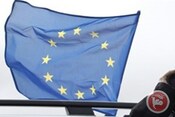
About 37 former European officials have called on the European Union to reject the US-proposed peace plan, also known as "Deal of the Century," designed to liquidate the Palestinian rights, on Monday.
The former European officials addressed a letter to EU foreign policy chief, Federica Mogherini, urging her to reject United States President Donald Trump’s peace plan and warned of the plan’s implications for regional stability.
The letter, published in the Guardian news outlet, read, “We are convinced that a plan that reduces Palestinian statehood to an entity devoid of sovereignty, territorial contiguity and economic viability would severely compound the failure of previous peace-making efforts, accelerate the demise of the two-state option and fatally damage the cause of a durable peace for Palestinians and Israelis alike.”
The signatories urged the EU to embrace and promote a plan in line with the basic principles of international law as reflected in the agreed EU parameters for a resolution to the Israeli-Palestinian conflict.
The alternative plan, the letter noted, should be conducive to “the creation of a Palestinian state alongside Israel on borders based on the pre-1967 lines with mutually agreed, minimal and equal land swaps; with Jerusalem as the capital for both states; with security arrangements that address legitimate concerns and respect the sovereignty of each side and with an agreed, fir solution to the question of Palestinian refugees.”
The letter said, “Unfortunately, the current US administration has departed from longstanding US policy and distanced itself from established international legal norms,” criticizing Trump’s recognition of Jerusalem as Israel's capital, which was seen as recognition of “only one side’s claims to Jerusalem.”
Washington was also criticized for demonstrating “a disturbing indifference to Israeli settlement expansion” in the occupied West Bank and cutting hundreds of millions of dollars in aid to Palestinians, a move the letter said was “gambling with the security and stability of various countries located at Europe’s doorstep.”
The signatories called on European governments to “further commit to scale up efforts to protect the viability of a future two-state outcome” and the EU and all member states to “actively ensure the implementation of relevant UN security council resolutions, including consistent differentiations in accordance with UN security council resolution 2334, between Israel in its recognized and legitimate borders, and its illegal settlements in the occupied territories.”
The former European officials addressed a letter to EU foreign policy chief, Federica Mogherini, urging her to reject United States President Donald Trump’s peace plan and warned of the plan’s implications for regional stability.
The letter, published in the Guardian news outlet, read, “We are convinced that a plan that reduces Palestinian statehood to an entity devoid of sovereignty, territorial contiguity and economic viability would severely compound the failure of previous peace-making efforts, accelerate the demise of the two-state option and fatally damage the cause of a durable peace for Palestinians and Israelis alike.”
The signatories urged the EU to embrace and promote a plan in line with the basic principles of international law as reflected in the agreed EU parameters for a resolution to the Israeli-Palestinian conflict.
The alternative plan, the letter noted, should be conducive to “the creation of a Palestinian state alongside Israel on borders based on the pre-1967 lines with mutually agreed, minimal and equal land swaps; with Jerusalem as the capital for both states; with security arrangements that address legitimate concerns and respect the sovereignty of each side and with an agreed, fir solution to the question of Palestinian refugees.”
The letter said, “Unfortunately, the current US administration has departed from longstanding US policy and distanced itself from established international legal norms,” criticizing Trump’s recognition of Jerusalem as Israel's capital, which was seen as recognition of “only one side’s claims to Jerusalem.”
Washington was also criticized for demonstrating “a disturbing indifference to Israeli settlement expansion” in the occupied West Bank and cutting hundreds of millions of dollars in aid to Palestinians, a move the letter said was “gambling with the security and stability of various countries located at Europe’s doorstep.”
The signatories called on European governments to “further commit to scale up efforts to protect the viability of a future two-state outcome” and the EU and all member states to “actively ensure the implementation of relevant UN security council resolutions, including consistent differentiations in accordance with UN security council resolution 2334, between Israel in its recognized and legitimate borders, and its illegal settlements in the occupied territories.”
14 apr 2019

US President Donald Trump has warned the International Criminal Court (ICC) of “swift and vigorous response” if the Hague-based tribunal investigates Americans and Israelis for war crimes.
Trump issued the warning on Friday, after ICC judges rejected a request by the court’s prosecutor to probe atrocities committed by US forces in Afghanistan.
Trump hailed the unusual ruling as a “major international victory,” claiming that the Americans and Israelis should be immune from ICC prosecution.
“Since the creation of the ICC, the United States has consistently declined to join the court because of its broad, unaccountable prosecutorial powers; the threat it poses to American national sovereignty; and other deficiencies that render it illegitimate,” he said.
“Any attempt to target American, Israeli, or allied personnel for prosecution will be met with a swift and vigorous response,” he added.
Amnesty International denounced the ICC’s decision as a “shocking abandonment of victims” that would “weaken the court’s already questionable credibility.”
Biraj Patnaik, South Asia Director at Amnesty International, stressed that the ruling would be seen as a “craven capitulation to Washington’s bullying.”
Last month, US Secretary of State Mike Pompeo announced that the US would withdraw or revoke visas for ICC staff who prosecute American troops in Afghanistan, as well as their allied personnel, including Israelis.
He also warned about potential economic sanctions “if the ICC does not change its course.”
US National Security Adviser John Bolton had also threatened to revoke the visas of ICC personnel if the court pursued charges against members of the US military over crimes in Afghanistan.
Earlier this month, the US revoked ICC prosecutor Fatou Bensouda’s visa as part of a crackdown on the ICC.
The ICC has been examining abuses committed by all parties in the Afghan war for more than a decade.
In November 2017, Bensouda sought authorization to open an inquiry into war crimes and crimes against humanity in Afghanistan, including in states where the CIA held prisoners.
The ICC is also investigating Israeli atrocities in the West Bank and Gaza, including the demolition of Palestinian property and eviction of the Palestinians from the West Bank and East Jerusalem al-Quds.
Neither the US nor Israel are ICC members.
The United States has revoked the entry visa of the prosecutor of the International Criminal Court (ICC), Fatou Bensouda, who is looking into the US military’s possible war crimes in Afghanistan.
US Secretary of State Mike Pompeo announced, last month, that the United States would withdraw or deny visas for the ICC personnel probing the war crimes allegations against American forces.
United Nations human rights experts denounced Washington’s “improper interference” in the work of the court, which has the jurisdiction to prosecute individuals for the international crimes of genocide, crimes against humanity, war crimes, and crimes of aggression.
The US denial of visa to the ICC prosecutor also drew criticism from within the European Union.
“We can confirm that the U.S. authorities have revoked the prosecutor’s visa for entry into the US,” Bensouda’s office told the Reuters news agency in an e-mail, on Thursday.
Last month, the US secretary of state also declared that Washington was ready to take additional steps, including economic sanctions, if the world body failed to change its course.
The United States has refused to cooperate with international investigators over their probe into possible war crimes of US military personnel in Afghanistan, claiming they violate US sovereignty.
The administration of US President Donald Trump has previously rebuked and questioned the International Criminal Court. One of National Security Adviser John Bolton’s first speeches was about the ICC, condemning its investigation into US personnel.
The US invaded Afghanistan, in October of 2001, and overthrew a Taliban regime in power at the time. But, US forces have remained bogged down, there, through the presidencies of George W. Bush, Barack Obama and, now, Donald Trump.
Obama announced, in 2013, that he was pulling out all US troops from the Arab country. However, the US troops returned to Iraq a year later, under the pretext of fighting the Daesh (ISIS) terrorist group.
Trump had also pledged, during his election campaign, to end the US military presence in Iraq and Afghanistan. But, he has changed his mind, since entering office, and prolonged the US military presence in both countries.
The ICC has repeatedly highlighted alleged abuses of detainees, by American troops between 2003 and 2005, that it believes have not been adequately addressed by the US government.
Washington insists that the ICC does not have jurisdiction over American citizens because the US never ratified the Rome Statute that established the court in the first place, PNN reports.
Trump issued the warning on Friday, after ICC judges rejected a request by the court’s prosecutor to probe atrocities committed by US forces in Afghanistan.
Trump hailed the unusual ruling as a “major international victory,” claiming that the Americans and Israelis should be immune from ICC prosecution.
“Since the creation of the ICC, the United States has consistently declined to join the court because of its broad, unaccountable prosecutorial powers; the threat it poses to American national sovereignty; and other deficiencies that render it illegitimate,” he said.
“Any attempt to target American, Israeli, or allied personnel for prosecution will be met with a swift and vigorous response,” he added.
Amnesty International denounced the ICC’s decision as a “shocking abandonment of victims” that would “weaken the court’s already questionable credibility.”
Biraj Patnaik, South Asia Director at Amnesty International, stressed that the ruling would be seen as a “craven capitulation to Washington’s bullying.”
Last month, US Secretary of State Mike Pompeo announced that the US would withdraw or revoke visas for ICC staff who prosecute American troops in Afghanistan, as well as their allied personnel, including Israelis.
He also warned about potential economic sanctions “if the ICC does not change its course.”
US National Security Adviser John Bolton had also threatened to revoke the visas of ICC personnel if the court pursued charges against members of the US military over crimes in Afghanistan.
Earlier this month, the US revoked ICC prosecutor Fatou Bensouda’s visa as part of a crackdown on the ICC.
The ICC has been examining abuses committed by all parties in the Afghan war for more than a decade.
In November 2017, Bensouda sought authorization to open an inquiry into war crimes and crimes against humanity in Afghanistan, including in states where the CIA held prisoners.
The ICC is also investigating Israeli atrocities in the West Bank and Gaza, including the demolition of Palestinian property and eviction of the Palestinians from the West Bank and East Jerusalem al-Quds.
Neither the US nor Israel are ICC members.
The United States has revoked the entry visa of the prosecutor of the International Criminal Court (ICC), Fatou Bensouda, who is looking into the US military’s possible war crimes in Afghanistan.
US Secretary of State Mike Pompeo announced, last month, that the United States would withdraw or deny visas for the ICC personnel probing the war crimes allegations against American forces.
United Nations human rights experts denounced Washington’s “improper interference” in the work of the court, which has the jurisdiction to prosecute individuals for the international crimes of genocide, crimes against humanity, war crimes, and crimes of aggression.
The US denial of visa to the ICC prosecutor also drew criticism from within the European Union.
“We can confirm that the U.S. authorities have revoked the prosecutor’s visa for entry into the US,” Bensouda’s office told the Reuters news agency in an e-mail, on Thursday.
Last month, the US secretary of state also declared that Washington was ready to take additional steps, including economic sanctions, if the world body failed to change its course.
The United States has refused to cooperate with international investigators over their probe into possible war crimes of US military personnel in Afghanistan, claiming they violate US sovereignty.
The administration of US President Donald Trump has previously rebuked and questioned the International Criminal Court. One of National Security Adviser John Bolton’s first speeches was about the ICC, condemning its investigation into US personnel.
The US invaded Afghanistan, in October of 2001, and overthrew a Taliban regime in power at the time. But, US forces have remained bogged down, there, through the presidencies of George W. Bush, Barack Obama and, now, Donald Trump.
Obama announced, in 2013, that he was pulling out all US troops from the Arab country. However, the US troops returned to Iraq a year later, under the pretext of fighting the Daesh (ISIS) terrorist group.
Trump had also pledged, during his election campaign, to end the US military presence in Iraq and Afghanistan. But, he has changed his mind, since entering office, and prolonged the US military presence in both countries.
The ICC has repeatedly highlighted alleged abuses of detainees, by American troops between 2003 and 2005, that it believes have not been adequately addressed by the US government.
Washington insists that the ICC does not have jurisdiction over American citizens because the US never ratified the Rome Statute that established the court in the first place, PNN reports.
13 apr 2019

The United States administration denied entry to Omar Barghouti, a Palestinian human rights defender and a co-founder of the Boycott, Divestment and Sanctions (BDS) Movement, this week allegedly due to his political activities.
The Arab American Institute (AII) said that Barghouti was barred from boarding a flight, on Wednesday, from Israel’s Ben Gurion Airport to New York for a speaking tour and his daughter’s wedding, despite having the required Israel-issued travel documents and a valid visa.
AII, which coordinated Barghouti’s US visit, said in a statement that he was informed by airline staff at the Ben Gurion Airport that the US Consulate in Tel Aviv had directed US immigration services to deny his entry.
The statement said Barghouti was not provided an explanation for his denial of entry beyond being told it was an “immigration matter.”
Due to his role in BDS, Barghouti, who is a resident of Acre (Akka) holds Israeli permanent resident status, was barred from leaving Israel several times in recent years, by refusing to renew travel documents, which are automatically granted to Palestinians who do not hold a full Israeli citizenship.
Regarding the denial of entry, Barghouti said in a statement, “This US entry ban against me, which is ideologically and politically motivated, is part of Israel’s escalating repression against Palestinian, Israeli and international human rights defenders in the BDS movement for freedom, justice and equality.”
He added, “Israel is not merely continuing its decades-old system of military occupation, apartheid and ethnic cleansing; it is increasingly outsourcing its outrageous, McCarthyite repression to the US and to xenophobic, far-right cohorts across the world.”
Barghouti accused supporters of what he described as Israeli apartheid in the US of being “desperately trying to deny US lawmakers, media, diverse audiences … of their right to listen, first-hand, to a Palestinian human rights advocate calling for ending US complicity in Israel’s crimes against our people.”
Barghouti explained how devastating it is to be denied the right to attend his own daughter’s wedding, “One thing that this ban deprives me of and that I cannot compensate is the right to be at my US-based daughter’s wedding. I am hurt, but I am not deterred.”
The Boycott, Divestment, and Sanctions (BDS) movement is a global campaign promoting various forms of boycott against Israel until it meets what the campaign describes as "Israel's obligations under international law," which include its withdrawal from the occupied territories, removal of the separation wall in the occupied West Bank, full equality for Arab-Palestinian citizens in Israel, and promotion of the right of return of Palestinian refugees to their homelands, now known as Israel.
The Arab American Institute (AII) said that Barghouti was barred from boarding a flight, on Wednesday, from Israel’s Ben Gurion Airport to New York for a speaking tour and his daughter’s wedding, despite having the required Israel-issued travel documents and a valid visa.
AII, which coordinated Barghouti’s US visit, said in a statement that he was informed by airline staff at the Ben Gurion Airport that the US Consulate in Tel Aviv had directed US immigration services to deny his entry.
The statement said Barghouti was not provided an explanation for his denial of entry beyond being told it was an “immigration matter.”
Due to his role in BDS, Barghouti, who is a resident of Acre (Akka) holds Israeli permanent resident status, was barred from leaving Israel several times in recent years, by refusing to renew travel documents, which are automatically granted to Palestinians who do not hold a full Israeli citizenship.
Regarding the denial of entry, Barghouti said in a statement, “This US entry ban against me, which is ideologically and politically motivated, is part of Israel’s escalating repression against Palestinian, Israeli and international human rights defenders in the BDS movement for freedom, justice and equality.”
He added, “Israel is not merely continuing its decades-old system of military occupation, apartheid and ethnic cleansing; it is increasingly outsourcing its outrageous, McCarthyite repression to the US and to xenophobic, far-right cohorts across the world.”
Barghouti accused supporters of what he described as Israeli apartheid in the US of being “desperately trying to deny US lawmakers, media, diverse audiences … of their right to listen, first-hand, to a Palestinian human rights advocate calling for ending US complicity in Israel’s crimes against our people.”
Barghouti explained how devastating it is to be denied the right to attend his own daughter’s wedding, “One thing that this ban deprives me of and that I cannot compensate is the right to be at my US-based daughter’s wedding. I am hurt, but I am not deterred.”
The Boycott, Divestment, and Sanctions (BDS) movement is a global campaign promoting various forms of boycott against Israel until it meets what the campaign describes as "Israel's obligations under international law," which include its withdrawal from the occupied territories, removal of the separation wall in the occupied West Bank, full equality for Arab-Palestinian citizens in Israel, and promotion of the right of return of Palestinian refugees to their homelands, now known as Israel.
